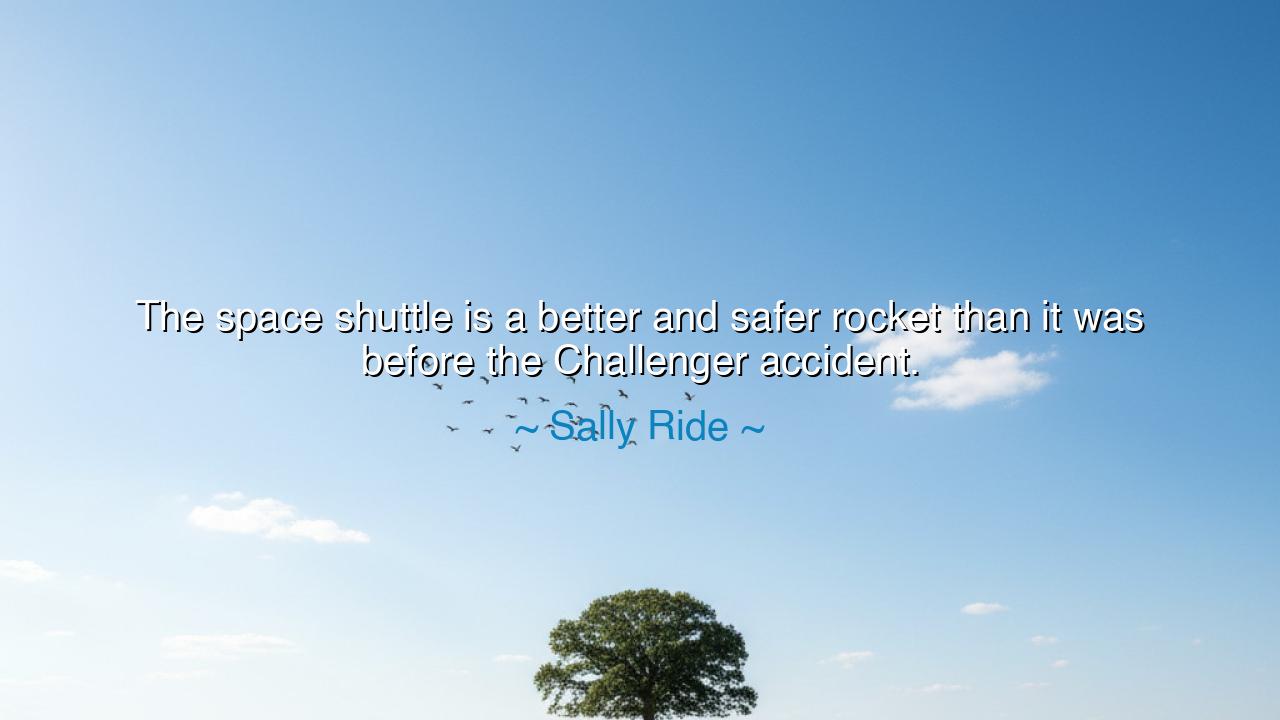
The space shuttle is a better and safer rocket than it was before
The space shuttle is a better and safer rocket than it was before the Challenger accident.






Hear the words of Sally Ride, traveler of the heavens and witness to triumph and tragedy: “The space shuttle is a better and safer rocket than it was before the Challenger accident.” At first glance, these words seem to speak only of machines, of bolts and engines, of fuel and flame. But listen with the heart, and you will hear a deeper song. They speak of failure and rebirth, of how catastrophe, though terrible, can become the soil from which wisdom grows.
The Challenger accident of 1986 was no small wound. The world watched in horror as the shuttle burst apart in the sky, taking with it seven lives—explorers, teachers, heroes. It was a shattering of confidence, a reminder that human ambition carries risk, and that space, though wondrous, is merciless. Many would have turned away in despair, abandoning the heavens for fear of the price. Yet Sally Ride, who served on the commission that investigated the tragedy, proclaimed this truth: that from sorrow and loss, the shuttle could be made stronger, the mission made safer, the dream preserved.
This is no new lesson in the chronicles of humankind. In ancient times, the builders of ships learned only through shipwrecks how to craft vessels that could endure the sea. The architects of temples and towers grew wiser when stones fell and foundations cracked. Likewise, the warriors of old, defeated in battle, returned to the field with new tactics and greater resolve. In every age, disaster has been a cruel but powerful teacher. What endures is not the fall, but the rising after—the will to rebuild better than before.
Consider also the spirit of those who perished aboard Challenger. They sought not comfort, but the frontier. They dared the heavens knowing the dangers. Their sacrifice was not the end of the dream, but the torch that lit the path forward. It is in their honor that engineers worked tirelessly to strengthen the shuttle, to learn from every flaw, to ensure that the sky could be reached again. In this way, their deaths were not in vain—they became the seed of safety, the foundation of progress.
Sally Ride’s words, then, are not only about rockets. They are about the resilience of the human spirit. She reminds us that tragedy, though it burns, can forge us anew. That which fails us can, if studied with honesty and courage, become the very thing that carries us higher. For every life—whether of a person, a family, a people—will face its Challenger moment, its fiery test. What matters is whether we hide from it, or whether we rise to make ourselves better and stronger.
Let us then take her teaching into our own lives. When you stumble, do not let shame or sorrow chain you down. Examine the fall. Learn from it. Strengthen the weak places in your spirit as the shuttle was strengthened in its engines. Seek counsel, seek wisdom, and resolve that you will not repeat the same errors. For every failure can be a stepping-stone if the heart is willing to face it without fear.
Therefore, O seekers of truth, remember: safety and strength are born from honesty with our failures. The heavens are not reached by those who never fall, but by those who rise again, wiser and more steadfast than before. This is the legacy of Challenger, this is the wisdom of Sally Ride, and this is the call to every soul: do not fear your failures—turn them into the fuel that carries you beyond the stars.






AAdministratorAdministrator
Welcome, honored guests. Please leave a comment, we will respond soon